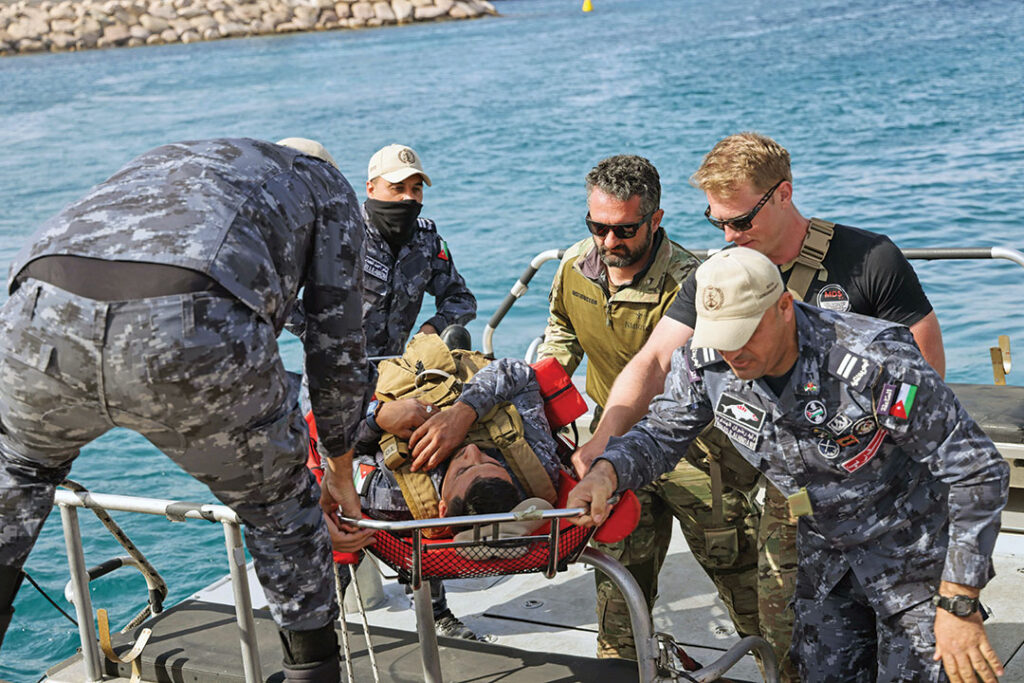A suspicious ship entered Jordanian territorial waters and ignored inquiries from radio operators at the Maritime Operations Center in the Port of Aqaba.
A submersible drone surveying that stretch of sea noticed the ship launch a speedboat. Aboard the boat were militants who raced ashore and seized a civilian port.
A multinational rapid reaction force went into action. After an initial setback in which the intruders shot down a friendly aircraft with a rocket-propelled grenade, multinational troops intercepted and boarded the suspicious ship.
Other units stormed the terrorist-occupied port by land and sea and retook the building occupied by the enemy.
As the final operation of the mission, Navy divers descended to the wreckage of the downed airplane to
remove explosives, extract trapped pilots and recover the plane’s black box.

This demonstration of military skill was part of International Maritime Exercise (IMX) 2025, one of the most important military exercises in the region. IMX is a recurring exercise organized by U.S. Navy Central Command and the U.S. 5th Fleet based in the Kingdom of Bahrain. In the ninth iteration of the exercise in February 2025, more than 30 countries participated.
IMX 25 occurred under three major commands: the Bahrain-based Combined Task Force East, with activities carried out in the Arabian Gulf and the Arabian Sea; Jordan-based Combined Task Force West, with events in the Gulf of Aqaba and the Red Sea; and the Mine Counter Measures Task Force that trained in the Arabian Sea and the Indian Ocean.
This year’s IMX demonstrated the ability of participating countries to enforce order at sea and impose maritime security when necessary, enhance coordination among countries constituting coalition forces and expand global maritime engagement by involving international governmental and nongovernmental maritime organizations.
The exercise also aimed to develop traditional maritime technologies and employ newer, more advanced technologies, especially unmanned naval systems, and to demonstrate their ability to meet common maritime security challenges.
IMX 25 was the second time the Royal Jordanian Navy led a portion of the exercise. Eight friendly and brotherly countries participated in Combined Task Force West in Aqaba — Jordan, the United States, Egypt, Yemen, Great Britain, Italy, Greece and Cyprus.
The exercise took place over two weeks. The first week was for academic training on topics as such as tactical combat casualty care, underwater remotely operated vehicles, Navy explosive ordnance disposal, rescue operations and handling underwater wrecks.
The academics were followed by a week of field training exercises that included mine sweeping, boarding and searching ships, salvaging aircraft and patrolling the seas with aerial, surface and underwater unmanned systems.
Conducting multilateral naval exercises is a key factor in reaching a commonly-accepted level of coordination among naval forces. Most navies can demonstrate skills in these areas, but we are much more efficient if we can work as a team.
Regardless of the hats we wear, the flags on our uniforms or the adversaries we confront, our naval forces will function as a single unit whenever and wherever needed if we invest in the kind of unifying efforts we saw during the two weeks of IMX.
New at the 2025 exercise was a greater emphasis on artificial intelligence technology and its integration into the maritime operations environment to detect maritime threats. Employed optimally, such technology will lead to greater security.
The opportunity to use surface-supplied air diving systems, with diving bells and long hoses, was invaluable. This technology allowed for extended underwater missions.
In future iterations of IMX, we hope to include coastal air defense activities, since the Royal Jordanian Navy has expanded to include an air defense unit.
We are thankful that the multinational forces engaged in Combined Task Force West in Jordan had a good chance to interact and learn from one another. This is only the beginning. In the future, we hope to take part in and organize additional events such as this phenomenal exercise.

